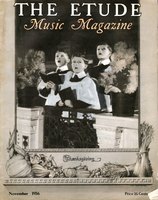AT THE PEAK of his fame, a master musician, pianist and composer, Liszt loved nothing so much as discovering talent and genius in others. But though hundreds of young students had sent him their compositions, Grieg had not.
Imagine then, young Grieg’s astonishment on receiving, in the year 1868, a letter from Rome, written in French by Franz Liszt, praising Grieg’s “Sonata for Violin and Piano,” which someone had shown him.
This letter changed Grieg’s whole life. For at twenty-five, full of melodic harmonies which were too modern, too dissonant to find either publishers or friends, Grieg was in despair. But when Liszt’s letter of warm appreciation was shown to the Storthing, or Parliament, of Norway, they changed their minds and allowed their young countryman a yearly pension which meant freedom and the opportunity to compose.
It meant too a trip to Rome to see Liszt! Two unforgettable days for the young Norwegian. For on the first day, Liszt played his “Sonata for Violin and Piano,” both parts at once. As Greig watched, Liszt seemed to be all over the piano at one and the same time, never missing a note, bringing out the full tonal quality of the violin—a truly masterly performance.
On the second day, Grieg carried with him to the old monastery the manuscript of his “Concerto in A minor for Piano.” It had just that day arrived back from a publisher in Leipzig who had refused it.
“Oh, now you will play this for me,” he beamed.
“Oh, but I couldn’t,” said Grieg, much embarrassed. “I have not practiced it.”
“Very well, then,” replied Liszt, smiling at his guests, “I will show you that I, also, cannot play it.”
Whereupon he read it at sight, at so fast a tempo that Grieg had to slow him down, and with such ease that he had time to make comments upon it to his listeners, brilliant remarks about his comprehension of it as he played.
So impressed was he with the finale that he repeated it. “When he had finished,” wrote Grieg, “he handed me the manuscript and said in a cordial tone, ‘Fahren Sie fort; ich sage Ihnen, Sie haben das Zeug dazu, und—lassen Sie nicht abschrecken’ (Keep steadily on; I tell you, you have the capability, or the capacity, for it, and—do not let them intimidate you) .”



